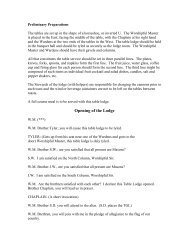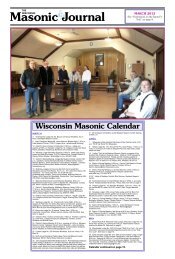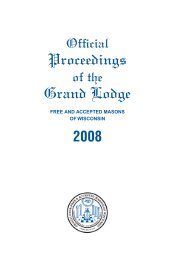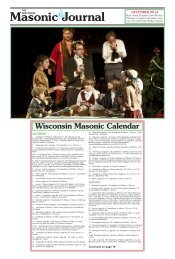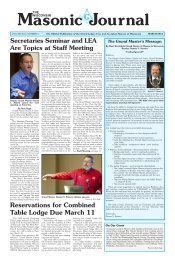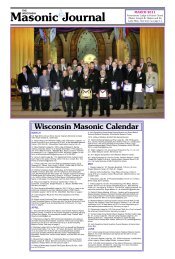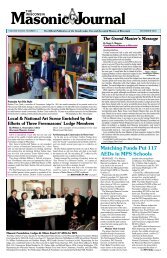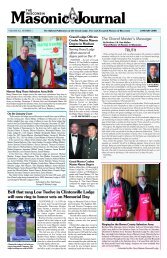WMJ Oct 2007 - Freemasons of Wisconsin
WMJ Oct 2007 - Freemasons of Wisconsin
WMJ Oct 2007 - Freemasons of Wisconsin
Create successful ePaper yourself
Turn your PDF publications into a flip-book with our unique Google optimized e-Paper software.
SCRIPTURE READINGS(1ST DEGREE)By Wade D. Bridges, P.M.Georgia Lodge <strong>of</strong> ResearchThis Short Talk Bulletin for September<strong>2007</strong> was taken from apaper by Bro. Wade D. Bridges,P.M., <strong>of</strong> the Georgia Lodge <strong>of</strong>Research. In the entire paper thescripture readings for all threedegrees were explained.This portion <strong>of</strong> the paper dealsonly with the Scripture lesson <strong>of</strong> theEntered Apprentice Degree. Thepaper was published in Vol. XIX,Transactions 2005, Georgia Lodge<strong>of</strong> Research.(Note: This paper has been compiledfrom a set <strong>of</strong> three by W Bro.Wade D. Bridges, P.M. <strong>of</strong> GeorgiaLodge <strong>of</strong> Research, who expresslyasserts they are not his original workbut a compilation <strong>of</strong>, and commentaryon, the work <strong>of</strong> others.Unless otherwise stated, Bible referencesare to the Standard KingJames Version.)THE ENTEREDAPPRENTICE DEGREEPsalm 133A “Song <strong>of</strong> Degrees” <strong>of</strong> DavidVerse 1: Behold, how good andhow pleasant it is for brethren todwell together in unity!Verse 2: It is like the precious ointmentupon the head, that ran downupon the beard, even Aaron’s beard;that went down to the skirts <strong>of</strong> hisgarments.Verse 3: As the dew <strong>of</strong> Hermon,and as the dew that descended uponthe mountains <strong>of</strong> Zion; for there theLord commanded the blessing, evenlife for evermore.History <strong>of</strong> the Book <strong>of</strong> PsalmsWhile some ascribe all <strong>of</strong> thePsalms to King David, the heavierweight <strong>of</strong> authority is that the greaterpart <strong>of</strong> them were written by David.The most widely accepted breakdownis 73 are attributed to KingDavid; twelve to Asaph; eleven tothe sons <strong>of</strong> Korah; two to KingSolomon (the 72nd and 12th); oneto Etna and one to Moses (the 90th).There is no widespread agreementon the authorship <strong>of</strong> the remainingPsalms: a few attribute some <strong>of</strong> themto the aforementioned men, whilesome are designated as “Anonymous.”Many <strong>of</strong> the Psalms were composedover the course <strong>of</strong> many yearsand were begun to be collected intoa body <strong>of</strong> literature in the time <strong>of</strong>King David. As the book contains150 independent compositions, it isnot susceptible <strong>of</strong> any logical analysis.Psalms 120 to 143 are sometimesreferred to as Pilgrim psalms orSongs <strong>of</strong> Degrees which may havebeen sung by the Jews as theyascended the heights <strong>of</strong> Jerusalemfor annual feasts.The Psalms present a wide range<strong>of</strong> human experiences: men burdenedwith affliction; struggling withtemptation; or triumphing in thehope or enjoyment <strong>of</strong> deliverance,admiring perfection <strong>of</strong> the Divinity,thanking God for his mercies, meditatingon His truths, or delighting inHis service; all <strong>of</strong> these and more areexhibited in the Book <strong>of</strong> Psalms.King DavidSince King David is considered bymost authorities to have written the133rd Psalm, a brief biographicalScripture Readings:The Entered Apprentice DegreeA Short Talk BulletinPublished by The Masonic Service Association <strong>of</strong> North Americasketch on him is in order.David, the second king <strong>of</strong> Israel,was the great-grandson <strong>of</strong> Boaz andRuth (Ruth, iv, 18). He was theyoungest <strong>of</strong> the eight sons <strong>of</strong> Jesse <strong>of</strong>the tribe <strong>of</strong> Judah, dwelling in Bethlehem,where David was born.According to the usually acceptedBiblical chronology, David was bornin 1085 B.C. and reigned as Kingfrom 1055 to 1015 B.C. Somerecent writers now date his reignfrom 30 to 50 years later.David first appears in Scripture as ashepherd lad, tending his father’sflocks in the fields near Bethlehem.While his three elder brothers were inKing Saul’s army, fighting against thePhilistines, David was sent to thearmy camp with some provisions:there he heard that the giant,Goliath, had challenged all Israel tosingle combat. David volunteered toaccept the challenge.David’s victory over Goliath wonfor him the friendship <strong>of</strong> Jonathan,the son <strong>of</strong> King Saul, and a permanentposition at the King’s court.However, David’s popularityaroused the jealousy <strong>of</strong> Saul.David, being made captain <strong>of</strong> athousand men, encountered manydangers in order to win the hand <strong>of</strong>Merob, Saul’s eldest daughter, but inspite <strong>of</strong> the King’s promise, she wasgiven to another man. Michol, Saul’sother daughter loved David: KingSaul, hoping that David would bekilled by the Philistines, promised togive her in marriage, provided Davidcould slay one hundred Philistines inbattle.David succeeded and marriedMichol. This success, however, madeSaul even more paranoid aboutDavid, so he ordered (that) David bekilled. Through the intervention <strong>of</strong>Jonathan, David was spared, butSaul’s hatred obliged David to flee.A meeting with Jonathan convincedDavid that reconciliation withSaul was impossible, so for the rest <strong>of</strong>Saul’s reign, David was an exile.Samuel, the Prophet and last <strong>of</strong>the Judges, had been sent to anointDavid as King in place <strong>of</strong> Saul,whom God had rejected for disobedience.Seven years after David wasanointed, King Saul and Jonathanwere killed in a battle.By God’s command, David wentto Hebron to claim the throne. Themen <strong>of</strong> Judah accepted him as king,and he was again anointed. Civilwar lasted for some time, but David’spower continued to increase. Aftermany military victories, David wasanointed King <strong>of</strong> all Israel.King David was successful in makingIsrael an independent state.Jerusalem was made the capital andpolitical center <strong>of</strong> Israel. There he builta palace, took more wives and concubines,and begat many children.He resolved to make Jerusalemthe religious center <strong>of</strong> his people bybringing to it the Ark <strong>of</strong> theCovenant. This he accomplished,but later, when David proposed tobuild a temple for it, he was told bythe prophet Nathan that God hadreserved this task for David’s successor,David being a man <strong>of</strong> blood.While King David’s army was inthe field during the campaign againstthe Ammonites, he fell into the sins<strong>of</strong> adultery and murder, thus bringinggreat calamities on himself andhis people.The last days <strong>of</strong> David were aggravatedby the ambition <strong>of</strong> Adonijah,whose plans for the succession werefrustrated by Nathan the prophet,and Bathsheba, the mother <strong>of</strong>Solomon. Solomon, who was bornafter David’s repentance, was chosenin preference to his older brothers.To make sure Solomon wouldsucceed to the throne, David hadhim publicly anointed.The last recorded words <strong>of</strong> theaged king are an exhortation toSolomon to be faithful to God, toreward loyal servants, and to punishthe wicked.David died at the age <strong>of</strong> seventy,having reigned for some seven yearsin Hebron and thirty-three years inJerusalem.To Solomon had been reservedthe privilege <strong>of</strong> building God’sHouse, but David made amplepreparations for the work by amassingenormous treasures and materials,as well as by transmitting to hisson a plan for the building.Explanation <strong>of</strong> Psalm 133First Verse:“Behold, how good and howpleasant it is for Brethren to dwelltogether in unity!” (Note differencesin Contemporary English Versionand Hebrew Scriptures.)Abingdon’s “Interpreters’ One VolumeCommentary” says this wisdompsalm was intended to combat apractice which threatened to destroythe traditional structure <strong>of</strong> Israelitesociety. If brothers continued to dwelltogether after the death <strong>of</strong> theirfather, then the estate remainedundivided and the family’s inheritancein the Holy Land was keptintact.The development <strong>of</strong> commerceand the urbanization <strong>of</strong> society hadinduced many young men to selltheir share <strong>of</strong> the inheritance and go<strong>of</strong>f on their own. Here King Davidurges that the old custom is goodand pleasant.The opening word, Behold, maysuggest King David was referring to aparticular instance <strong>of</strong> the blessing <strong>of</strong>brotherly concord; <strong>of</strong> that we canonly guess. At least, he was telling usto “observe” or “take note” <strong>of</strong> the joyand pleasure that is derived fromunity or harmony among brethren.This peaceful unity is <strong>of</strong> extremeimportance to Masons as it is thecement which binds us together as afraternity; Peace and Harmony arethe strength <strong>of</strong> our Fraternity.Second Verse:“It is like the precious ointmentupon the head, that ran down uponthe beard, even Aaron’s beard, thatwent down to the skirts <strong>of</strong> his garments.”The Hebrew Scripture says that theoil runs down “over the collar <strong>of</strong> hisrobes.” Most authors <strong>of</strong> commentariesagree that the “collar” ratherthan the bottom <strong>of</strong> the robe is what iscontemplated.In the “Dictionary <strong>of</strong> Biblical Theology”is the following: “Anointing:for the Hebrews, oil penetratesdeeply into the body (Psalm 109:18)and it gives the body strength,health, joy, and beauty. On the religiouslevel, it is understandable thatanointings <strong>of</strong> oil were consideredsigns <strong>of</strong> rejoicing or <strong>of</strong> respect. Theywere also used as rites <strong>of</strong> healing orconsecration.”With this definition <strong>of</strong> anointing inmind, we can understand the purpose<strong>of</strong>, or for, anointing with oil. Letus look at some examples:Anointing is a sign <strong>of</strong> joy or <strong>of</strong>honor, especially when done withperfumed oil (see Proverbs 27:9 andEcclesiastes 9:8). It was used particularlyin festivals (Amos 6:6). Theimage <strong>of</strong> anointing served to expressthe joy <strong>of</strong> the people <strong>of</strong> Israel assembledat Jerusalem for the great festivals.It also played a part in thedescription <strong>of</strong> the Messianic banquet:On the mountain they willdrink joy, they will drink wine, theywill be anointed with perfumed oilupon this mountain (Isaiah 25:6,Septuagint).It is especially in this context <strong>of</strong>Messianic joy that there recurs theformula, “Oil <strong>of</strong> Gladness” (Isaiah61:3, Psalm 45:8, Hebrews 1:9). So,dwelling together in unity is as the“oil <strong>of</strong> gladness”. Psalm 133 showsthat obedience to God’s law, or system<strong>of</strong> living together, is a joy, happiness,and gladness.Verse 2 illustrates the “good” <strong>of</strong>Verse 1, by recalling the oil <strong>of</strong> joy(ointment), thinking <strong>of</strong> the oil thatwas used to anoint a High Priest.Aaron stood as the personification <strong>of</strong>High Priesthood and the representation<strong>of</strong> the Hebrew nation. The copiousanointing which poured downover his garments symbolized thesolidarity <strong>of</strong> Israel.The first two verses <strong>of</strong> the Psalmtogether thus present to us the ideathat brotherly unity is the spirit <strong>of</strong>God coming effusively upon theanointed one. Conversely, we mayconclude the spirit <strong>of</strong> God is productive<strong>of</strong> loving goodwill and brotherlyharmony.Third Verse: As the dew <strong>of</strong> Hermon,and as the dew that descendedupon the mountains <strong>of</strong> Zion; forthere the Lord commanded theblessing, even life for evermore.Mount Hennon is one <strong>of</strong>, if not the,most notable mountains in northernIsrael, as well as the highest mountainin the region <strong>of</strong> Palestine. It risesto the north and east <strong>of</strong> Dan, traditionallythe extreme northern limit <strong>of</strong>Israel. Zion was, in biblical times, thehill upon which the temple stood inJerusalem. In poetical imagery wehave a linking together <strong>of</strong> the twomost prominent peaks <strong>of</strong> the northernand southern kingdoms, alludingto unification and therefore harmony.Verse 3 illustrates the “pleasant” <strong>of</strong>Verse 1, by referring to the dews <strong>of</strong>Hennon, which are proverbial. Thisdew was known as nature’s way <strong>of</strong>compensating for her failure to giverain, and symbolized refreshmentand quickening. Palestine was asdesolate as the desert until thebrethren came together in brotherlyfellowship; then, like the dews <strong>of</strong>Hennon, they brought freshness andlife, and the resurrection <strong>of</strong> ideals.There, God decreed the blessingupon this great brotherhood, whichwould mean life and prosperity forever,a promise by God <strong>of</strong> his blessing<strong>of</strong> immortality, an endowmentfor obedience to God’s law, for followingGod’s way <strong>of</strong> life.Context <strong>of</strong> Psalm 133At the heart <strong>of</strong> the first verse <strong>of</strong> thisscripture is the necessity for Brethrento live in peace and harmony. Twoexamples are given here <strong>of</strong> howvaluable the unity is. The first is that<strong>of</strong> the precious “ointment” or oil withwhich Aaron, Moses’ older brotherand spokesman, was consecrated asIsrael’s first High Priest.The second example is that <strong>of</strong> thedew <strong>of</strong> Hennon, which was essentialto the success <strong>of</strong> Israelite agricultureand therefore life itself. They usuallygot the earlier and later rains, but thedew was necessary for their cropsduring the long hot summers. In thatarid region, the dew was essential tosustain life itself.Unity is essential in a MasonicLodge; unity <strong>of</strong> purpose and <strong>of</strong> execution.The 133rd Psalm then is aglorification <strong>of</strong> the beauty and necessity<strong>of</strong> brotherly love and unity,which is why this Scripture is an integralpart <strong>of</strong> the Entered ApprenticeDegree. wmjMasons In Southwest Enjoy SummerMasonic Float in Potosi & Mineral Point ParadesJerry Patter, a member <strong>of</strong> Warren Lodge No. 4, Potosi, and a plural member<strong>of</strong> Mineral Point Lodge No. 1, takes this float to most parades in Southwest<strong>Wisconsin</strong>. This picture was taken in Mineral Point at the July Fourth parade.Anyone recognize those Masons on the float?Summer Picnic in Mineral PointMineral Point Lodge No. 1 held a summer picnic on July 22 this year hostedby the former Rewey Lodge members. There were over 50 members andtheir families in attendance.– Submitted by Bro. Bill Buckingham, Mineral Point Lodge No. 1WISCONSIN MASONIC JOURNAL - OCTOBER <strong>2007</strong> - PAGE 13



